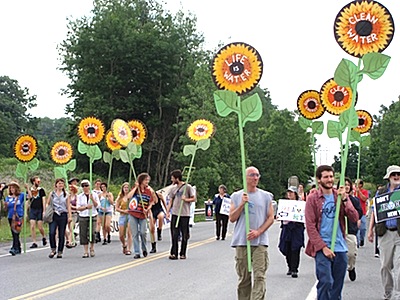- By Dan Veaner
- News
 Print
Print  With chants of 'we're gonna beat back that frack attack' about 65 protesters marched on the Cayuga Power Plant Saturday, objecting to a proposed plan to convert the plant from coal to natural gas. Protesters claimed the coal powered plant is polluting Cayuga Lake, and objected to the conversion plan they said would use gas mined by hydrofracking.
With chants of 'we're gonna beat back that frack attack' about 65 protesters marched on the Cayuga Power Plant Saturday, objecting to a proposed plan to convert the plant from coal to natural gas. Protesters claimed the coal powered plant is polluting Cayuga Lake, and objected to the conversion plan they said would use gas mined by hydrofracking."When we fight to permanently retire this facility and shut it down we fight for our friends and families and neighbors in Pennsylvania who spend each day in fear with their water poisoned, their children sick, and their farms scarred with frack wells," said Finger Lakes Action Network's Kat Stevens.

The Cayuga Power Plant is one of two coal-powered plants recently purchased by an investment consortium now called Upstate New York Power Producers (UNYPP) when previous owner AES Cayuga filed for bankruptcy. The 306 megawatt (MW) plant is currently battling NYSEG for its survival. NYSEG has filed a plan to close the Lansing plant in favor of an upgrade to the transmission system. UNYPP has countered with four potential plans for converting the plant from coal to natural gas, which would make the plant competitive in the power market. All four plans include a 200MW solar array that CEO Jerry Goodenough says is a start toward eventually moving toward more renewable options. The New York State Public Service Commission (PFC) is expected to rule on whether or not the plant will close later this year.
The protesters marched down Cayuga Drive wielding signs painted to look like sunflowers with anti-fracking slogans to a spot on Millikin Station Road across from large coal piles that power the plant. A large Deputy Sheriff presence was on hand to keep protesters off private property, maintain order, and facilitate local traffic. After the speeches protesters sang songs.
 (From left) Finger Lakes Action Network's Kat Stevens, Cornell Engineer and Lecturer Francis Vanek, Cayuga Lake Watershed Network Steward/Executive Director Hilary Lambert, 'Seneca Lake 12' activist Michael Dineen, Tompkins County Legislator Carol Chock
(From left) Finger Lakes Action Network's Kat Stevens, Cornell Engineer and Lecturer Francis Vanek, Cayuga Lake Watershed Network Steward/Executive Director Hilary Lambert, 'Seneca Lake 12' activist Michael Dineen, Tompkins County Legislator Carol ChockStevens said her vision for the people of Lansing is non-industrial renewable energy and fair paying permanent jobs that do not support the fossil fuel industry, but was not specific about how local jobs and tax revenue would be replaced. She stated she wants the plant closed forever. She was joined by four other speakers including Cornell Engineer and Lecturer Francis Vanek, Cayuga Lake Watershed Network Steward/Executive Director Hilary Lambert, activist Michael Dineen and Tompkins County Legislator Carol Chock.
Lambert said coal from the plant pollutes the air and water when it is mined, destroying streams, and pollutes further when it is cleaned for market and combusted. She said a landfill on the property holds combustion waste from coal burned in the plant. She said the plant is discharging grossly elevated levels of arsenic, cadmium, and selenium into the lake, and the landfill is also discharging lead into the lake. She noted that it is her job to advocate for the lake.
"Right now we see a town, Lansing, a beautiful town, a wonderful and diverse town that is beholding to this facility for a large percentage of its school costs," she said. "They are really up a creek if this plant does not stay operating. This beholding-ness to the coal industry, the energy industry, to natural gas could be all of our future, so we need to help Lansing move beyond this situation."
Chock also acknowledged struggling taxpayers and local jobs as part of the equation, while others said they want the plant closed no matter what. Stevens and Dineen advocated non-violent civil disobedience at future rallies. Dineen, who spent eight days in jail last April after he and eleven other protesters styling themselves 'The Seneca Lake 12' tried to block a truck from entering a gas storage company site. He accused the DEC with collaborating with power plant officials to allow exceptions to land fill laws that result in toxic chemicals leeching into Cayuga Lake.

"What can we do about it?" he said. "We're now speaking our minds, standing here. We're going to take pictures and show them on Facebook and get other people to know that a lot of people in the community don't accept this plan to transfer this plant to a gas burning plant. We don't want the plant here at all. At some point you're going to want to step up further and commit civil disobedience."
Tompkins County Legislator Carol Chock took a different approach, encouraging the protesters to work within the system, writing the PFC and providing information to the Tompkins County Legislature. She said the PFC is offering a false choice to either convert the plant to natural gas or close it. She said there is no reason why those choices can't be expanded to include renewable energy choices that will allow plant investors to make a profit while contributing to a clean future in Tompkins County.
"This one is a tough one," Chock said. "There is a tax base here. We have a community that's relied on this plant. There needs to be a transition. The Legislature needs to figure out ways that we can assist and work together with the private investors to go toward a renewable future. We want to be part of the discussion. Why should our community be selected to repower? But also why should our community be selected to have our power plant closed down? That's got to be part of the discussion."
v9i25



